短暂动词和延续性动词练习题
短暂动词和延续性动词练习题

延续性动词和短暂性动词的使用在学习现在完成时的过程中,我们经常碰到类似这样的句子:1)这辆自行车我已经买了五年了。
2)这位老人已经去世五年了。
此时,有些同学就想当然的将之翻译为:1)I have bought this bike for five years.(此句突出“买”的动作。
言下之意,到现在还没有买到。
)2)The old man has died for five years.(此句突出“死”的动作,给人的感觉是“这位老人五年期间一直在死亡线上挣扎”。
)造成这种错误的主要原因是学习者在运用动词的过程中,将瞬间动词与延续性动词混为一谈。
英语中,动词按其动作发生的方式、动作发生过程的长短,可分为延续性动词和瞬间动词。
那么,什么是瞬间动词呢?简而言之,瞬间动词也叫短暂性动词或终止性动词。
这种动词是指它们动作的开始也就意味着动作的结束,所以不能直接跟表示一段的时间状语连用。
如open, close, finish, begin, come, go, arrive, reach, get to, leave, move, borrow, buy, die等。
延续性动词表示能够延续的动作,这种动作可以延续下去或产生持久影响。
如:learn, work, stand, lie, know, walk, keep, have, wait, watch, sing, read, sleep, live, stay等。
延续性动词可以用于现在完成时,其完成时态可与表示"段时间"的状语连用。
延续性动词不能与表示短暂时间的"点时间"状语连用.It raind at eight yesterday morning.(误) rain为延续性动词,而at eight表示"点时间",前后显然矛盾。
如果用延续性动词表示一瞬间的动作,可以借助come, begin, get等终止性动词来表示。
现在完成时练习(短暂性动词与延续性动词的转换)
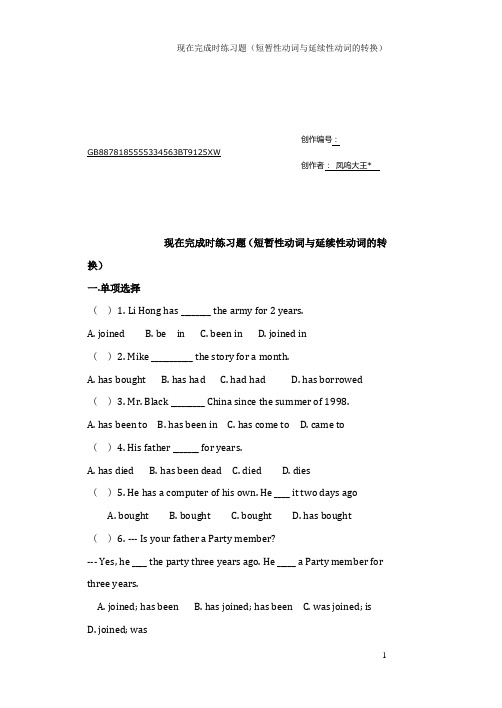
创作编号:GB8878185555334563BT9125XW创作者:凤呜大王*现在完成时练习题(短暂性动词与延续性动词的转换)一.单项选择()1. Li Hong has ________ the army for 2 years.A. joinedB. be inC. been inD. joined in()2. Mike ___________ the story for a month.A. has boughtB. has hadC. had hadD. has borrowed ()3. Mr. Black _________ China since the summer of 1998.A. has been toB. has been inC. has come toD. came to()4. His father _______ for years.A. has diedB. has been deadC. diedD. dies()5. He has a computer of his own. He ____ it two days agoA. boughtB. boughtC. boughtD. has bought()6. --- Is your father a Party member?--- Yes, he ____ the party three years ago. He _____ a Party member for three years.A. joined; has beenB. has joined; has beenC. was joined; isD. joined; was()7. ---What a nice bike! How lone ____ you ____ it? ----Just five weeks.A. will; buyB. did; buyC. are; havingD. have; had()8. I ______ this book for a week .I have to return it now.A. borrowedB. have borrowedC. keptD. have kept ()9. ----______ your sister _______ in Green China for a long time? ----Yes. She joined it five years ago.A. Has; beenB. Have; beenC. Has; joinedD. Have; joined()10. ---How long have you _______ from the USA? ----For three months.A. come backB. returnedC. go backD. been back ()11. I _____ this book for half a year.A. have boughtB. have hadC. boughtD. had ()12. The students are sorry to hear that famous singer _______ for a year.A. has leftB. has goneC. has been awayD. has gone away()13. He ____ a cold for three days.A. has caughtB. has hadC. has gotD. caught()14. Jim Green ____ in China for two years.A. has comeB. has beenC. has arrivedD. came ()15. The film ____ for half an hour.A. has been onB. has begunC. hasn’t begunD.began()16.How long have you _______ this book?A. Bought B.borrowed C.had D.lent()17.His grandpa _______ for two years.A.was died B.has been dead C.was dead D.has died()18. His sister ______ her hometown for three years. She'll return next year.A.left B.has left C.has been away D.has been away from()19、His father ______ the Party since 1978 .A. joined B. has joined C. was in D. has been in ()20、—Do you know him well ?—Sure .We _________ friends since ten years ago .A. were B. have been C. have become D. have made()21、—How long have you ____ here ?—About two months .A. been B. gone C. come D. arrived()22、Hurry up! The play __________ for ten minutes .A. has begun B. had begunC. has been on D. began()23、 has Mr White been a member of Greener China since he to China?A. How soon, comesB. How often, gotC. How long, cameD. How far, arrived()24、His uncle for more than 9 years.A. has come hereB. has started to workC. has lived thereD. has left the university二.句型转换((每空一词)。
延续性动词与短暂性动词讲解与练习
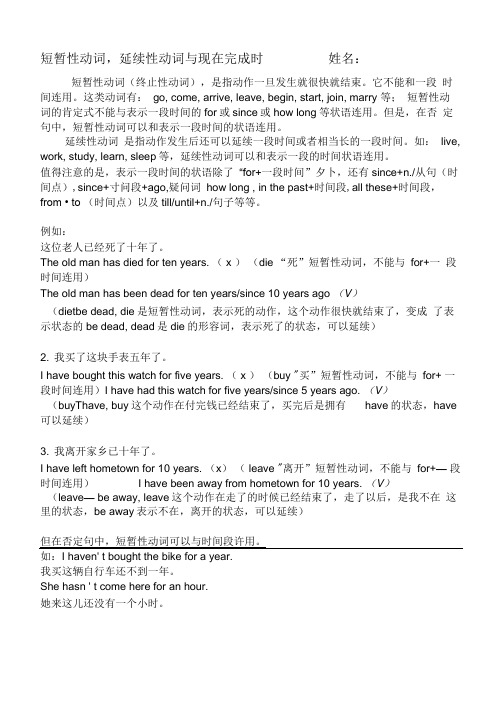
短暂性动词,延续性动词与现在完成时姓名:短暂性动词(终止性动词),是指动作一旦发生就很快就结束。
它不能和一段时间连用。
这类动词有:go, come, arrive, leave, begin, start, join, marry 等;短暂性动词的肯定式不能与表示一段时间的for或since或how long等状语连用。
但是,在否定句中,短暂性动词可以和表示一段时间的状语连用。
延续性动词是指动作发生后还可以延续一段时间或者相当长的一段时间。
如:live, work, study, learn, sleep等,延续性动词可以和表示一段的时间状语连用。
值得注意的是,表示一段时间的状语除了“for+一段时间”夕卜,还有since+n./从句(时间点),since+寸问段+ago,疑问词how long , in the past+时间段,all these+时间段,from • to (时间点)以及till/until+n./句子等等。
例如:这位老人已经死了十年了。
The old man has died for ten years. ( x )(die “死”短暂性动词,不能与for+一段时间连用)The old man has been dead for ten years/since 10 years ago (V)(dietbe dead, die是短暂性动词,表示死的动作,这个动作很快就结束了,变成了表示状态的be dead, dead是die的形容词,表示死了的状态,可以延续)2. 我买了这块手表五年了。
I have bought this watch for five years. ( x )(buy "买”短暂性动词,不能与for+ 一段时间连用)I have had this watch for five years/since 5 years ago. (V)(buyThave, buy这个动作在付完钱已经结束了,买完后是拥有have的状态,have 可以延续)3. 我离开家乡已十年了。
常用短暂性动词与延续性动词及其例句
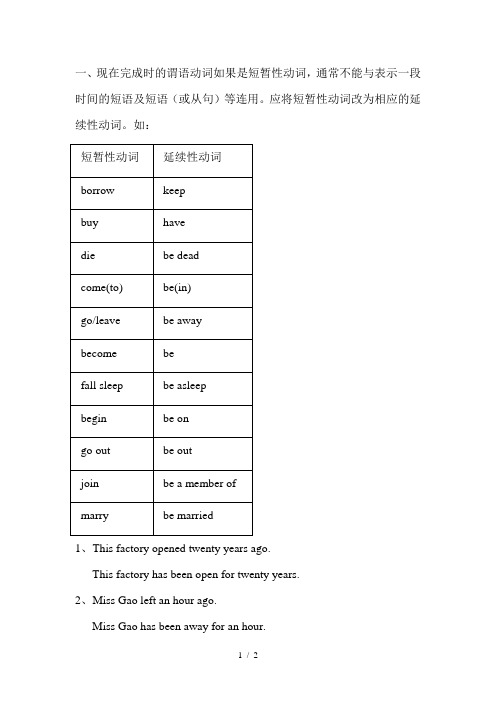
一、现在完成时的谓语动词如果是短暂性动词,通常不能与表示一段时间的短语及短语(或从句)等连用。
应将短暂性动词改为相应的延续性动词。
如:1、This factory opened twenty years ago.This factory has been open for twenty years.2、Miss Gao left an hour ago.Miss Gao has been away for an hour.3、Her teacher has been a Party member for 3 years.Her teacher joined the Party 3 years ago.4、The film began two minutes ago.The film has been on since two minutes ago.5、He bought the bike two years ago.He has had the bike for two years.6、The old man died ten years ago.The old man has been dead for ten years.7、He came back 3 days ago.He has been back for 3 days.8、I left my hometown 10 years ago.I have been away from my hometown for 10 years.9、They got married 13 year ago.They have been married for 13 years.10、I borrowed the book a week ago.I have kept the book for a week.How long have you kept the book?注:在否定句中,短暂性动词可以和表示一段时间的状语连用。
短暂性动词与延续性动词
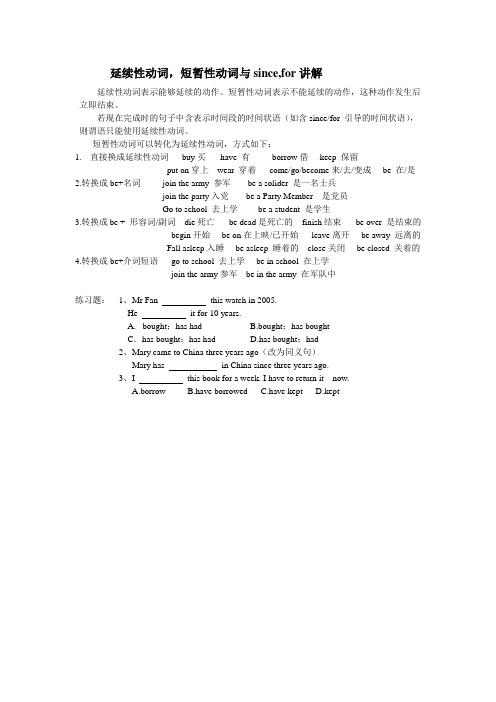
延续性动词,短暂性动词与since,for讲解延续性动词表示能够延续的动作。
短暂性动词表示不能延续的动作,这种动作发生后立即结束。
若现在完成时的句子中含表示时间段的时间状语(如含since/for 引导的时间状语),则谓语只能使用延续性动词。
短暂性动词可以转化为延续性动词,方式如下:1.直接换成延续性动词buy买-----have 有borrow借----keep 保留put on穿上---wear 穿着come/go/become来/去/变成----be 在/是2.转换成be+名词join the army 参军----- be a solider 是一名士兵join the party入党------be a Party Member 是党员Go to school 去上学-------be a student 是学生3.转换成be + 形容词/副词die死亡-----be dead是死亡的finish结束-----be over 是结束的begin开始----be on在上映/已开始leave离开----be away 远离的Fall asleep入睡----be asleep 睡着的close关闭----be closed 关着的4.转换成be+介词短语go to school 去上学----be in school 在上学join the army参军---be in the army 在军队中练习题:1、Mr Fan this watch in 2005.He it for 10 years.A.bought;has hadB.bought;has boughtC.has bought;has had D.has bought;had2、Mary came to China three years ago(改为同义句)Mary has in China since three years ago.3、I this book for a week. I have to return it now.A.borrowB.have borrowedC.have keptD.kept。
短暂动词与延续性动词

短暂(duǎnzàn)动词与延续性动词短暂(duǎnzàn)动词与延续性动词1.现在(xiànzài)完成时的构成:have / has + 动词(dòngcí)的过去分词2.现在(xiànzài)完成时的用法:(1)表示某一动作或状态开始(kāishǐ)于过去并持续到现在现在。
(此种用法适用于延续性动词)I have been in Nanyang for around 5 years.我在南阳(nán yánɡ)大约有五年了。
(2)表示过去发生或已经完成的某一动作对现在造成的影响或结果(此种用法适用非延续性动词)。
I can’t go to see the movie now, because I have lost the ticket.现在我看不成电影了,因为我把票弄丢了。
3.现在完成时的标志:just, already, yet, ever, never,recently 近来 = in recent weeks (months, years)在最近的几周(月,年)里,nowadays, for + 一段时间,before (用于句子末尾); so far = up to now = till now; since + 过去某一具体时间点,since + 过去的一段时间 + ago, since + 一般过去时从句,ever since then = ever since = since then = since (自从那时起);in / over /during + the + past(last) + 一段时间。
Eg.On January 11,1998, Dr. Kataria organized the first “World Laughter Day” celebration in Mumbai, India. It was a huge success.The date was later changed to the first Sunday in May and it has been celebrated every year since.4.现在完成时中的特殊用法:短暂动词(dòngcí)的各种时态(包括现在完成时在内)不能和时间段连用(liányòng),当它需要与时间段连用时需转换为延续性动词。
现在完成时练习(短暂性动词与延续性动词的转换)
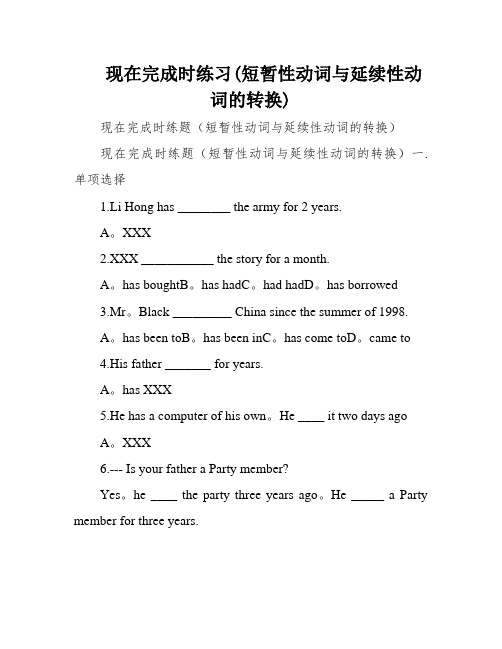
现在完成时练习(短暂性动词与延续性动词的转换)现在完成时练题(短暂性动词与延续性动词的转换)现在完成时练题(短暂性动词与延续性动词的转换)一.单项选择1.Li Hong has ________ the army for 2 years.A。
XXX2.XXX ___________ the story for a month.A。
has boughtB。
has hadC。
had hadD。
has borrowed3.Mr。
Black _________ China since the summer of 1998.A。
has been toB。
has been inC。
has come toD。
came to4.His father _______ for years.A。
has XXX5.He has a computer of his own。
He ____ it two days agoA。
XXX6.--- Is your father a Party member?Yes。
he ____ the party three years ago。
He _____ a Party member for three years.A。
joined。
has beenB。
has joined。
has beenC。
was joined。
isD。
joined。
was()7.---What a nice bike。
How lone ____ you ____ it。
----Just five weeks.A。
will。
buyB。
did。
buyC。
are。
havingD。
have。
had8.I ______ this book for a week。
I have to return it now.A。
XXX9.----______ your sister _______ in Green China for a long time?Yes。
初中现在完成时练习(延续性动词与瞬间性动词之间的转换等)
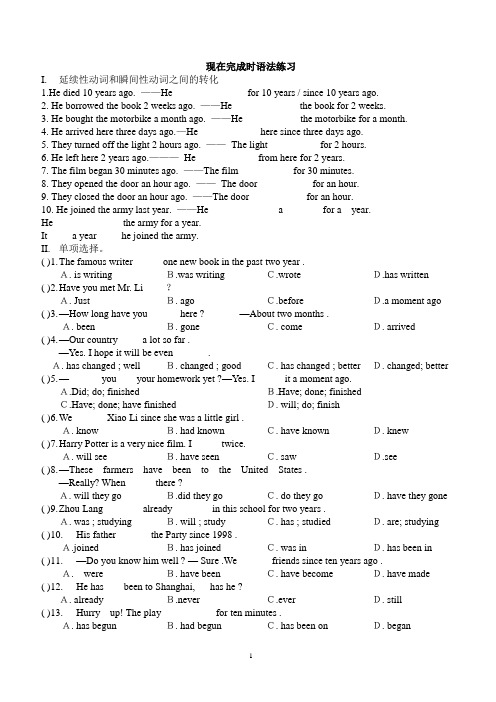
现在完成时语法练习I.延续性动词和瞬间性动词之间的转化1.He died 10 years ago. ——He ______________ for 10 years / since 10 years ago.2. He borrowed the book 2 weeks ago. ——He _____________the book for 2 weeks.3. He bought the motorbike a month ago. ——He ___________the motorbike for a month.4. He arrived here three days ago.—He ____________here since three days ago.5. They turned off the light 2 hours ago. ——The light __________for 2 hours.6. He left here 2 years ago.———He ____________from here for 2 years.7. The film began 30 minutes ago. ——The film __________ for 30 minutes.8. They opened the door an hour ago. ——The door __________ for an hour.9. They closed the door an hour ago. ——The door ___________for an hour.10. He joined the army last year. ——He _____________ a _______ for a year.He _____________ the army for a year.It ____ a year ____ he joined the army.II.单项选择。
英语语法专题——短暂性动词与延续性动词
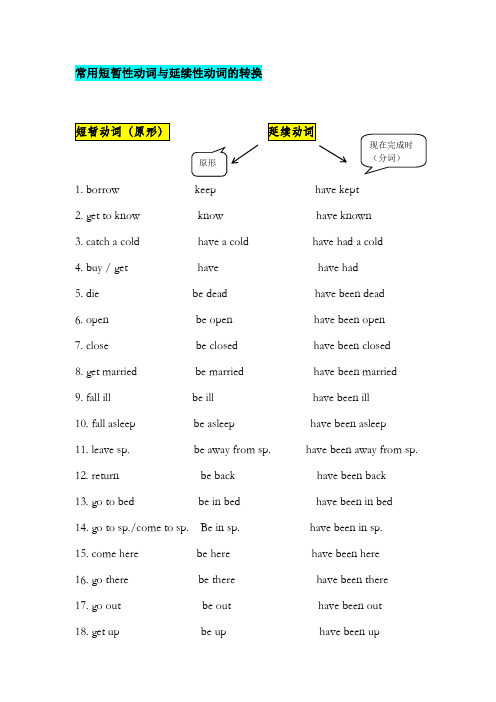
常用短暂性动词与延续性动词的转换1. borrow keep have kept2. get to know know have known3. catch a cold have a cold have had a cold4. buy / get have have had5. die be dead have been dead6. open be open have been open7. close be closed have been closed8. get married be married have been married9. fall ill be ill have been ill 10. fall asleep be asleep have been asleep 11. leave sp. be away from sp. have been away from sp. 12. return be back have been back 13. go to bed be in bed have been in bed 14. go to sp./come to sp. Be in sp. have been in sp. 15. come here be here have been here 16. go there be there have been there 17. go out be out have been out 18. get upbe uphave been up19. start/ begin be on have been on20. finish/ end be over have been over21. become be have been22. join be a member of have been a member ofbe in have been in23.begin / start be on have been on24.arrive be here/there/in ... have been here/there/in...25.put on wear 或be on have worn / have been on瞬时动词语法要点:我们以最常用的瞬时动词go为例,将相关知识点进行梳理如下。
现在完成时练习(短暂性动词与延续性动词的转换)
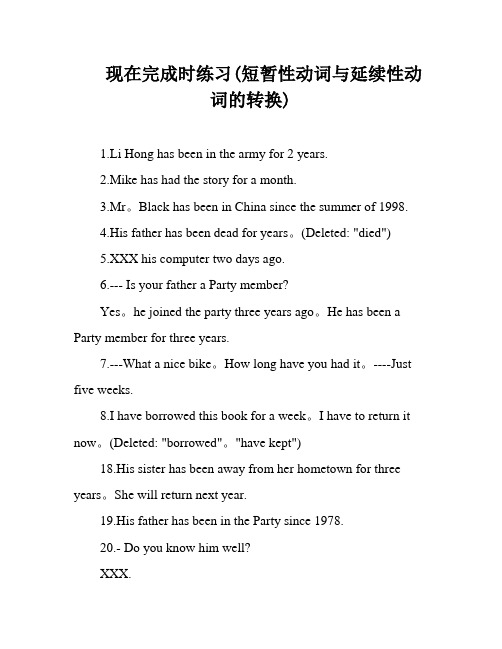
现在完成时练习(短暂性动词与延续性动词的转换)1.Li Hong has been in the army for 2 years.2.Mike has had the story for a month.3.Mr。
Black has been in China since the summer of 1998.4.His father has been dead for years。
(Deleted: "died")5.XXX his computer two days ago.6.--- Is your father a Party member?Yes。
he joined the party three years ago。
He has been a Party member for three years.7.---What a nice bike。
How long have you had it。
----Just five weeks.8.I have borrowed this book for a week。
I have to return it now。
(Deleted: "borrowed"。
"have kept")18.His sister has been away from her hometown for three years。
She will return next year.19.His father has been in the Party since 1978.20.- Do you know him well?XXX.21.- How long have you been here?About two months.22.Hurry up。
The play has been on for ten minutes.23.How long has Mr。
英语短暂性动词和延续性动词
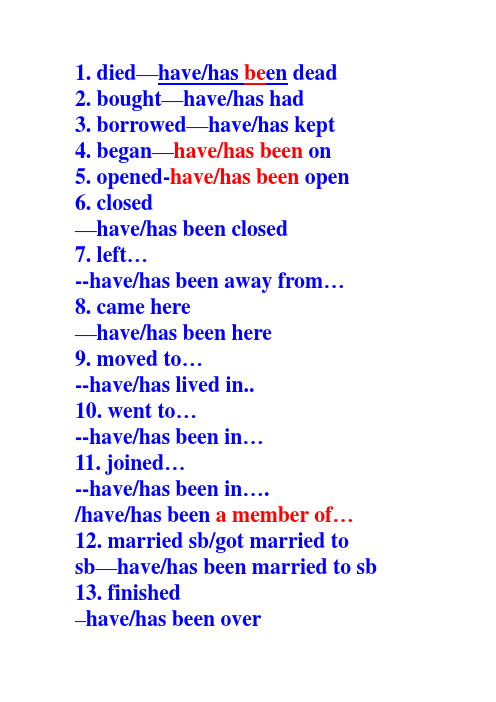
1. died—have/has be en dead2. bought—have/has had3. borrowed—have/has kept4. began—have/has been on5. opened-have/has been open6. closed—have/has been closed7. left…--have/has been away from…8. came here—have/has been here9. moved to…--have/has lived in..10. went to…--have/has been in…11. joined…--have/has been in…./have/has been a member of…12. married sb/got married to sb—have/has been married to sb 13. finished–have/has been over14. made/became friends—have/has been friends15. began to teach—have/has taught16. lose (lost)—haven’t/hasn’t had17.become (became)—have/has been ******************************* * He went to London in 1990. He is still in London now.→He has been in London since 1990. * I borrowed the book two weeks ago. →I have kept the book for two weeks/since two weeks ago.It is two weeks since I borrowed the book.●He joined the League two yearsago. = It is two years since hejoined the League.= He has been in the League for two years/ since two years ago.同义句(用两种方法变):1.The film began ten minutes ago. It is …since….It is ten minutes since the film began. The film has been on for ten minutes/since ten minutes ago.2.It is three days since he left.He left three days ago.He has been away from here for three days/since three days ago.3.He came here half an hour ago,and he is still here now.It is half an hour since he came here. He has been here for half an hour./since half an hour ago.4.Mary married Tom ten years ago. It is ten years since Mary married Tom.Mary has been married to Tom for ten years/since ten years ago.5.I began to teach English fourteenyears ago.It is fourteen years since I began to teach English.I have taught English for fourteen years/since fourteen years ago.I have been an English teacher for 14 years.Test in class1.He moved to Shenzhen two yearsago.It is two years since he moved to Shenzhen.He has lived in Shenzhen for two years/since two years ago.2.My father went to Shanghai lastweek.It is a week since my father went to Shanghai.My father has been in Shanghai since last week.3.Mike joined the army three yearsago.It is three years since Mike joined the army.Mike has been in the army for three years/since three years ago.4.It is ten minutes since the filmbegan.The film began ten minutes ago.The film has been on for ten minutes/since ten minutes ago.5.He bought the computer fourweeks ago.It is four weeks since he bought the computer.He has had the computer for four weeks/since four weeks ago.。
短暂性动词与延续性动词专项练习

句子转换——现在完成时1)I moved to the USA last year.I ________ ________ __________ the USA since __________ __________.2)They came here last week.They _________ _________ here since _________ __________.3)He came out two years ago.He _________ __________ _________ for __________ __________.4)We returned to Fuzhou yesterday.We ________ ________ _________ to Fuzhou since __________.5)7) I went home yesterday.I _______ ________ _________ home for _________ __________.6)The river became dirty last year.The river _________ _________ dirty for _________ __________.7)The shop closed two hours ago.The shop ________ _________ _________ for _________ _________.8)The door opened at six in the morning.The door ________ ________ ________ for six hours.9)11) I got up two hours ago.I ________ ________ ________ since ________ ________.__________10)I became a teacher in 2000.I ________ __________ a teacher for _________ _________.11)His father died in 2002.His father _______ _______ ________for _______ ________.12)The meeting finished at six.The meeting ________ ______ ______ for six hours.13)I got to sleep two hours ago.I ________ _________ _________ since _________ __________. __________14)They married in 1990.They ________ _________ __________since _________.15)He got to Beijing five minutes ago.He ________ _________ _________ Beijing for _________ _________.16)I began to teach at this school in 1995.I _________ _________ at this school since_________.17)The film began two minutes ago.The film _________ __________. __________ for _________ _________. 18)He left Fuzhou just now.He _______ ________ ________ _________ Fuzhou for five minutes.19)I bought a pen two hours ago.I _________ _________ a pen for ________ __________.20)I got to know him last year.I _________ __________ him since __________ __________.21)I put on my glasses three years ago.I __________ __________ my glasses for _________ _________.22)They borrowed it last week.They _________ _________ it since __________ __________.。
短暂性动词与延续性动词的转换

1. borrow keep have kept2. get to know know have known3. catch a cold have acold have had a cold4. buy have have had5. die be dead have been dead6. open be open have been open7. close be closed8. get married be married have been married9. fall ill be ill have been ill10. fall asleep be asleep have been asleep11. leave sp. be awayfrom sp. Have been awayfrom sp.12. return be back have been back13. go to bed be in bed14. come to the island be onthe island have been on theisland15. go to sp./come to sp. be insp. Have been in sp.16. come here be here have been here17. go there be there have been there18. go out be out have been out19. get up be up have been up20. start/ begin be onhave been on21. finish/ end be over have been over22. become be have been23. join be a member of have been a member ofbe in have been inarrive →be here begin(start)→ be ondie →be deadcome back→ be backleave →be away (from) fallill(sick, asleep)→be ill(sick, asleep)get up→be up go out →be outfinish →be over put on →wear 或be onopen →be open jo in →be in或be a member of…close →be closed go to school→ be a studentborrow →keep buy/get →havecatch(a cold)→ have(a cold) move to → live income to → be in marry → be married sit down → be seateddress → be dressedfinish/end → be overget to know →knowbegin to study →studycome to work→ work短暂性动词和延续性动词可以从字面上理解,持续的动作就是延续动词,反之就是瞬间动词(短暂动词),这个有这种感觉还是很好理解的,你看看下面的词吧。
中考英语短暂性动词与延续性动词相互转换讲练 (2)

中考英语短暂性动词与延续性动词相互转换讲练中考英语短暂性动词与延续性动词相互转换对应表语法讲解:1.现在完成时表示过去发生的某一动作或存在的状态,一直持续到现在,并可以和以 for或since引导的表示一段时间的状语连用,也可以用在以“how long”提问的句子中,句子中的谓语动词一般为延续性动词。
例:He has been away from Beijing for two years. = He left Beijing two years ago.When did the train arrive here? B. How long ____ the train ____ here?2.在现在完成时的肯定句中,非延续性动词作谓语动词时,不能和表示一段时间的状语连用。
但可以用其他句式来表示同一个意思。
例:Lucy has come back.The old man died 4 years ago. = The old man has been dead for 4 years.He has been away from Beijing for two years.= He left Beijing two years ago.= It is two years since he left Beijing.= Two years has passed since he left Beijing.3.非延续性动词可以在现在完成时的否定句中作谓语,并可以与for,since引导的时间状语连用,表示动作的延续过程。
例如:She h asn’t bought any new clothes since last year.I haven’t borrowed the book for a long time.巩固习题:1. When he arrived at the bus stop, the bus ________ for 20 minutes.A. has leftB. had leftC. has been awayD. had been away2. I ______ the League for 5 years so far.A. joinedB. have joinedC. have been in3. The factory ________ since the February of 1988.A . has been open B. has opened C. was open D. opened4. Mary and Rose _______friends since they met in 2000.A. have madeB. have beenC. madeD. have become5.The meeting _______ for a week now.A. has finishedB. has endedC. has been over6.Miss Gao ______ this school for nearly 5 years.A. has been inB. has come toC. has taught7.Ben ______ a teacher for 4 years .A. has beenB. has becomeC. wasD. became8. I ______ home for a week.A. have returnedB. have been backC. returned9. How long _______ he ________ ?A. diedB. has, diedC. has, been dead10. ----- How long can I ______ the book? ------ Two weeks.A. borrowB. lendC. getD. keep11.He ________ the car for a week.A. boughtB. has boughtC. has had12.-----How long _____ you _____ ill ? -----Two weeks.A. did fallB. have, fellC. have, been13.Since 2000, he _____ his hometown.A. has leftB. has moved awayC. has been away from14.I'll lend you the book , but you can only _____ it for 2 days.A. borrowB. keepC. take15.The bus ______ on the road for 2 hours so far.A. has stoppedB. stoppedC. has been16. Tom is ill in hospital. He _______ a cold for several days.A. isB. catchesC. has caughtD. has had17.He ________ for 2 hours.A. got upB. has got upC. has been up二、英语书面表达专项训练2.朋友是我们生活的组成部分,他们总是在我们最需要帮助的时候陪伴我们。
短暂性动词与延续性动词练习题教学文案

短暂性动词与延续性动词练习题短暂性动词与延续性动词一.写出下列动词的延续性动词come leave join diecatch a cold begin / start buyborrow finish二.单选题()1. When he arrived at the bus stop, the bus ________ for 20 minutes.A. has leftB. had leftC. has been awayD. had been away ()2. I ______ the League for 5 years so far.A. joinedB. have joinedC. have been in()3. The factory ________ since the February of 1988.A . has been open B. has opened C. was open D. opened()4. Mary and Rose _______friends since they met in 2000.A. have madeB. have beenC. madeD. have become()5. You mustn't ________ until he comes back.A. be awayB. leaveC. be left()6.The meeting _______ for a week now.A. has finishedB. has endedC. has been over()7.Miss Gao ______ this school for nearly 5 years.A. has been inB. has come toC. has taught()8.Ben ______ a teacher for 4 years .A. has beenB. has becomeC. wasD. became()9. I ______ home for a week.A. have returnedB. have been backC. returned()10. How long _______ he ________ ?A. diedB. has, diedC. has, been dead()11. ----- How long can I ______ the book? ------ Two weeks.A. borrowB. lendC. getD. keep()12.He ________ the car for a week.A. boughtB. has boughtC. has had() 13.-----How long _____ you _____ ill ? -----Two weeks.A. did fallB. have, fellC. have, been()14.Since 2000, he _____ his hometown.A. has leftB. has moved awayC. has been away from()15.I'll lend you the book , but you can only _____ it for 2 days.A. borrowB. keepC. take()16.The bus ______ on the road for 2 hours so far.A. has stoppedB. stoppedC. has been()17. Tom is ill in hospital. He _______ a cold for several days.A. isB. catchesC. has caughtD. has had()18.He ________ for 2 hours.A. got upB. has got upC. has been up。
- 1、下载文档前请自行甄别文档内容的完整性,平台不提供额外的编辑、内容补充、找答案等附加服务。
- 2、"仅部分预览"的文档,不可在线预览部分如存在完整性等问题,可反馈申请退款(可完整预览的文档不适用该条件!)。
- 3、如文档侵犯您的权益,请联系客服反馈,我们会尽快为您处理(人工客服工作时间:9:00-18:30)。
延续性动词和短暂性动词的使用在学习现在完成时的过程中,我们经常碰到类似这样的句子:1)这辆自行车我已经买了五年了。
2)这位老人已经去世五年了。
此时,有些同学就想当然的将之翻译为:1)I have bought this bike for five years.(此句突出“买”的动作。
言下之意,到现在还没有买到。
)2)The old man has died for five years.(此句突出“死”的动作,给人的感觉是“这位老人五年期间一直在死亡线上挣扎”。
)造成这种错误的主要原因是学习者在运用动词的过程中,将瞬间动词与延续性动词混为一谈。
英语中,动词按其动作发生的方式、动作发生过程的长短,可分为延续性动词和瞬间动词。
那么,什么是瞬间动词呢?简而言之,瞬间动词也叫短暂性动词或终止性动词。
这种动词是指它们动作的开始也就意味着动作的结束,所以不能直接跟表示一段的时间状语连用。
如open, close, finish, begin, come, go, arrive, reach, get to, leave, move, borrow, buy, die等。
延续性动词表示能够延续的动作,这种动作可以延续下去或产生持久影响。
如:learn, work, stand, lie, know, walk, keep, have, wait, watch, sing, read, sleep, live, stay等。
延续性动词可以用于现在完成时,其完成时态可与表示"段时间"的状语连用。
延续性动词不能与表示短暂时间的"点时间"状语连用.It raind at eight yesterday morning.(误) rain为延续性动词,而at eight表示"点时间",前后显然矛盾。
如果用延续性动词表示一瞬间的动作,可以借助come, begin, get等终止性动词来表示。
上句可改为:It began to rain at eight yesterday morning.(正)那么,如何使瞬间动词与表示一段时间的状语连用呢?此时,我们可以将这些词转换成意义相近的延续性词(组),从而间接表示其中的意思。
a)用延续性动词代替终止性动词1、用have代替buyMy brother has had(不能用has bought) this bike for almost four years.2、用keep或have代替borrowI have kept(不能用have borrowed) the book for quite a few days.3、用be替代becomeHow long has your sister been a teacher?4、用have a cold代替catch a coldTom has had a cold since the day before yesterday.5、用wear代替put onb)用“be+形容词”代终止性动词1、be+married代marry2、be+ill代fall (get) ill3、be+dead代die4、be+asleep代fall (get) asleep5、be+awake代wake/wake up6、be+gone代lose,die,sell,leave7、be+open代open 8、be closed代close/shut9、be+missing(gone,lost)代losec)用“be+副词”代终止性动词1“be+on”代start,begin2“be+up”代get up3“be+back(to)”代return to,come back to,go back to4“be here (there)”代come(arrive,reach,get) here或go (arrive,reach,get) there等等d)用“be+介词短语”代终止性动词1.“be in/at +地点”代替go to /come to2.用be in the army 代替join the army3.“be in/at +地点”代替move to延续性动词与不延续性动词延续性动词与非延续性动词动词按其动作发生的方式、发生过程的长短可分为延续性动词与非延续性动词。
一.延续性动词表示能够延续的动作,如:learn, work, stand, lie, know, walk, keep, have, wait, watch, sing, read, sleep, live, stay等。
延续性动词可以与表示时间段的状语连用。
表示时间段的短语有:for+一段时间,for 2 years; since从句,since he came here; since+时间点名词,since last year, since 5 days ago; how long; for a long time等。
例:He has lived here for 6 years. You can keep the book for 5 days. I stayed there for 2 weeks last year. How long did you stay there last year?二.非延续性动词也称终止性动词、瞬间动词,表示不能延续的动作,这种动作发生后立即结束。
如:open, die, close, begin, finish, come, go, move, borrow, lend, buy等。
非延续性动词在肯定句中与表示时间点的状语连用,如:two years ago; at 5 o'clock; 例:He died 5 years ago.否定的终止性动词可以与表示时间段的时间状语连用。
例:I haven't left here for 3 years. I haven't heard from him for 3 weeks.三.延续性动词与非延续性动词之间的转换:1.The old man died 4 years ago. ---- The old man has been dead for 4 years. ---- It is 4 years since the old man died. ----Four years has passed since the old man died.2.He joined the Party 2 years ago. -----He has been in the Party for 2 years.3.I bought the book 5 days ago. ---- I have had the book for 5 days.一.同意句替换(中考必考)短暂动词的一般过去式可以同意替换为延续性动词的现在完成时(for/since )1. borrow keep have keptHe borrowed my CD yesterday.2. get to know know have knownHe got to know the truth two days ago.3. catch a cold have a cold have had a coldHe caught a cold the day before yesterday.4. buy have have hadHe bought this computer four years ago.5. die be dead have been deadHe died in 1996.6. open be open have been openThe shop opened half an hour ago.7. close be closed have been closedThe factory closed last year.8. get married be married have been married They get married when he graduated from university.9. fall ill be ill have been illLast night ,he fell ill suddenly.10. fall asleep be asleep have been asleepHe fell asleep when he listened to the radio.11. leave sp. Be away from sp. Have been away from sp. He left the school after 18yesrs old.12. return be back have been backHe returned to China after 7 years.13. go to bed be in bed have been in bedHe didn’t go to bed until his mother came home.e to the island be on the island have been on the island Thomas came to the island when he was a child.15. go to sp./come to sp. Be in sp. Have been in sp.He went to Australia for further study last spring.16. come here be here have been hereHe came here last summer.17. go there be there have been thereHe went there with his secretary ten days ago on business.18. go out be out have been outHe went out when his neighbour came to his house.19. get up be up have been upHe got up immediately when he heard the bell ring20. start/ begin be on have been onThe concert started 7minutes ago21. finish/ end be over have been overHe finished all the schoolwork ten minutes ago.22. become be have beenHe become a basketball player when he was a little child.23. join be a member of have been a member ofBe in have been inHe joined the communist part in 1998.二.单项选择题1. When he arrived at the bus stop, the bus ________ for 20 minutes.A. has leftB. had leftC. has been awayD. had been away2. I ______ the League for 5 years so far.A. joinedB. have joinedC. have been in3.The factory _______ since the February of 1988.A . has been open B. has opened C. was open D. opened4.Mary and Rose _______friends since they met in 2000.A. have madeB. have beenC. madeD. have become5.You mustn't ________ until he comes back.A. be awayB. leaveC. be left6.The meeting _______ for a week now.A. has finishedB. has endedC. has been over7.Miss Gao _____ this school for nearly 5 years.A. has been inB. has come toC. has taught8.Ben ______ a teacher for 4 years .A. has beenB. has becomeC. wasD. became9.I ______ home for a week.A. have returnedB. have been backC. returned10.How long _______ he ________ ?A. diedB. has, diedC. has, been dead11.He ________ the car for a week.A. boughtB. has boughtC. has had12.-----How long ____ you _____ ill ? -----Two weeks.A. did fallB. have, fellC. have, been13.Since 2000, he _____ his hometown.A.has leftB.has moved awayC.has been away from14.I'll lend you the book , but you can only _____ it for 2 days.A. borrowB. keepC. take15.The bus _____ on the road for 2 hours so far.A. has stoppedB. stoppedC. has been16.Are you ____ the jacket these days?A. wearingB. putting onC. dressingD. on17.He _______ for 2 hours.A. got upB. has got upC. has been up。
